A great storyteller bridges the gap between “you” and “me” to make their audience feel one with them. They understand that story-telling is a conversation, a dialogue between people, an exchange of meaning and emotions. It is not a monologue or a seemingly never-ending transpose of information. Rather, it is a shared experience among equals in which the audience is just as active a participant as the storyteller, even if the storyteller is doing most of the talking. Our Himasset, Munmun Dhalaria is everything and beyond in a storyteller’s role, who believes in doing the visual talk through her camera’s lens. Her documentaries redefine the art of doing the unthinkable and take us on a monumental journey of education and experiences packed in one. .
Her unrivaled ability to do so is what makes her documentaries the standouts of the category she covers.
Dhalaria is a National Geographic Storytelling Explorer and an independent filmmaker, who touches upon wildlife conservation, gender and science communication as primary topics while filming. She has also been awarded the National Geographic Young Explorer grant for her stellar work in covering wildlife and human interest stories.
In 2018, a National Geographic grant supported her in documenting the rare Western Tragopan, considered a holy grail among birders and wildlife photographers. Her short film titled ‘The Jujurana’s Kingdom’, was published on National Geographic.
She recently produced “COVID RESPONSE- A Himalayan story”, with the help of a National Geographic Emergency Journalism Fund. The 25 minute documentary dwells deep on Himachal Pradesh’s battle with the COVID-19 Pandemic.
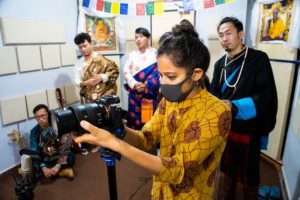
As Himachal Pradesh came into the clutches of a Pandemic as grave as the COVID-19, everything about people’s lives had undergone a wave of transformation.
Dhalaria emerged as a true Corona warrior as citizens stayed sheltered during the lockdown induced by the pandemic. Her documentary showcases the path-breaking work of COVID warriors in the form of doctors, paramedical staff members, administrative officers, police officers, social activists, artists, migrants and ASHA workers who were at the frontline in trying to control the Pandemic’s scare across the Himalayan town of Dharamsala.
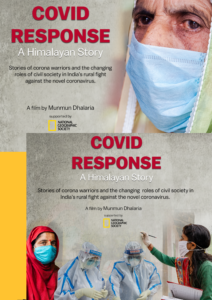
A four hour notice for a nationwide lockdown to halt the spread of the virus, had Dhalaria thinking what it was like for a small town like Dharamsala to cope with the new norm.
This became her drive to go on the ground and film her hometown’s response by having a closer look at the ways in which the coronavirus warriors were tackling the storm of the spread. The film highlights the migrant crisis in India through the eyes of Aditi Vajpeyi, a young activist at the Himachal Pradesh Workers Solidarity who helped migrants reach back home.
Many migrant workers, some with wives and children, lost their livelihood overnight because of the lockdown and for no fault of theirs. Munmun’s documentary shows the plight of the migrant workers who were forced to go back to their hometowns due to no work. Much like in other countries, COVID-19’s effect on India has been in part to starkly lay bare the inequities and injustices, rightly put by Dhalaria in her film.
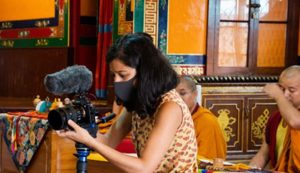
She was impressed to see the local administration, doctors and the police becoming more considerate while trying their level best to mitigate the damage caused by the lockdown.
Munmun confesses it was her supreme privilege to film doctors, ASHA workers and the paramedical staff who were most prone to the risk posed by the virus and were still on the frontline, serving people.
Artists like Meenakshi Sharma- program director of Dharamsala’s community radio “Gunjan Radio”, worked tirelessly throughout the lockdown to make sure the people were informed on the latest government guidelines.
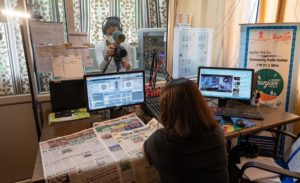
The documentary also highlights the work of rural development organisations like CORD, that have worked incessantly for years to uplift women and empower villages – work that was essentially important during the pandemic.
Munmun has been covering wildlife conservation in her films but feels it is her duty to highlight the real life stories around her during tough times. This documentary was also screened at “Cinemasala Film Festival” in Switzerland. The documentary also found its place amidst many mainstream media organisations and was featured by the likes of TheQuint and The Newslaundry.
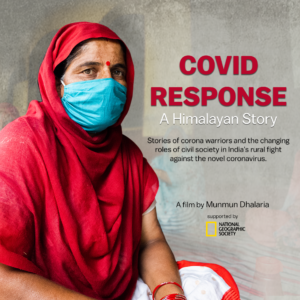
Munmun’s bravado and the desire to keep going with her stellar work is an illustrious example of how one should lead their way forward.

